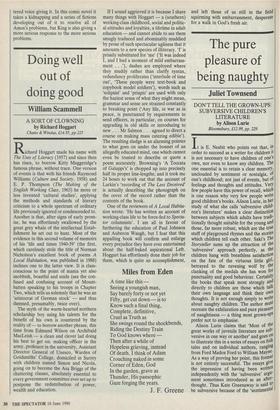Doing well out of doing good
William Scammell
A SORT OF CLOWNING by Richard Hoggart
Chatto & Windus, f14.95, pp.225
Richard Hoggart made his name with The Uses of Literacy (1957) and since then has risen, to borrow Kitty Muggeridge's famous phrase, without trace. One version of events is that with his friends Raymond Williams (Culture and Society, 1958) and E. P. Thompson (The Making of the English Working Class, 1963) he more or less invented 'cultural studies', applying the methods and standards of literary criticism to a whole spectrum of ordinary life previously ignored or condescended to. Another is that, after signs of early prom- ise, he was effortlessly swallowed by the great grey whale of the intellectual Estab- lishment he set out to hunt. Most of the evidence in this second volume of memoirs of his 'life and times 1940-59' (the first, which carelessly stole the title of Norman Nicholson's excellent book of poems A Local Habitation, was published in 1988) inclines one to the latter view. It is class- conscious to the point of mania yet also snobbish, boastful and snide (see the con- fused and confusing account of Mount- batten speaking to his troops in Chapter Two, which tells us solemnly that he was an `aristocrat of German stock' — and thus damned, presumably, twice over).
The myth of the warm-hearted northern scholarship boy using his talents for the benefit of his own is countered by the reality of — to borrow another phrase, this time from Edmund Wilson on Archibald MacLeish — a clean and clever lad doing his best to get on: making officer in the army, professor in the university, Assistant Director General of Unesco, Warden of Goldsmiths' College, domiciled in Surrey with children named Simon and Nicola, going on to become the Asa Briggs of the chattering classes, absolutely essential to every government committee ever set up to postpone the redistribution of power, wealth and education. If I sound aggrieved it is because I share many things with Hoggart — a (southern) working-class childhood, social and politic- al attitudes and loyalties, a lifetime in adult education — and cannot abide to see them smugly traduced and abominably muddied by prose of such spectacular ugliness that it amounts to a new species of illiteracy. 'I' is prissily substituted for 'me' (It was indeed I, and I had a moment of mild embarrass- ment . . .'), dashes are employed where they muddy rather than clarify syntax, redundancy proliferates (Interlude of time out', 'These people were text-book and copybook model soldiers'), words such as `solipsist' and 'priapic' are used with only the haziest sense of what they might mean, grammar and sense are strained constantly to breaking point (`Any life, in war as in peace, is punctuated by requirements to send officers, in particular, on courses for upgrading in old skills or introducing to new . . . Mr Salmon . . . agreed to direct a course on making mass catering edible'). The resulting sludge is an alarming pointer to what goes on under the bonnet of an allegedly educated mind, one which cannot even be trusted to describe or quote a poem accurately. Browning's 'A Toccata of Galuppi's' is chopped up into precisely half its proper line-lengths; and it took me 24 hours to work out that the account of Larkin's 'recording of The Less Deceived' is actually describing the photograph on the cover of the record rather than the contents of the book.
One of the reviewers of A Local Habita- tion wrote: 'He has written an account of working-class life to be force-fed to Specta- tor columnists'. I am all in favour of furthering the education of Paul Johnson and Auberon Waugh, but I fear that this appalling book will confirm and enlarge every prejudice they have ever entertained about the half-baked aspirational Left. Hoggart has effortlessly done their job for them, which is quite an accomplishment, and left those of us still in the field squirming with embarrassment, desperate for a walk in God's fresh air.


















































 Previous page
Previous page